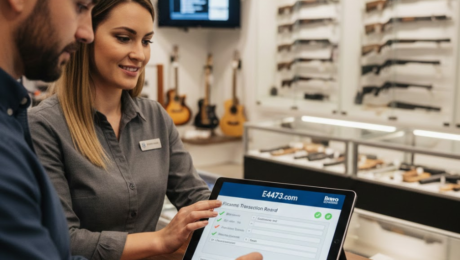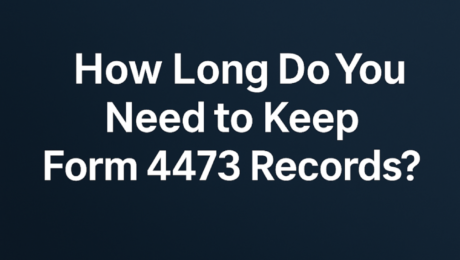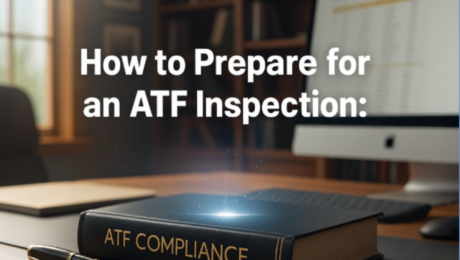If you’re a Federal Firearms Licensee (FFL) or a pawn shop adding firearms, ATF Form 4473 is one of the most important documents in your operation. To customers, it’s often referred to as “the background check form.” To licensees, it’s a legal firearm transfer record that directly impacts your compliance posture during ATF inspections. In today’s regulatory environment, even small clerical mistakes on Form 4473 can result in findings. Below, the teams at Bravo Store Systems and e4473.com break down what Form 4473 is, when it’s required, and how professionals manage it correctly. What Is ATF Form 4473? ATF Form 4473 (Firearms Transaction Record) documents the transfer of a firearm from an FFL to a non-licensee. Any time a firearm leaves your A&D (Acquisition & Disposition) record—including: Retail sales Trades Pawn redemptions …a properly completed Form 4473 is required, in accordance with current federal and applicable state requirements. Pawn Shop Note For pawn shops, when a firearm is redeemed and returned to the customer from licensed inventory, it is considered a disposition and typically requires: A new Form 4473 A background check consistent with federal and state procedures This applies even if the customer previously owned the firearm. Why Professionals Use Digital e4473 Systems Manual, paper-based 4473 processes are a common source of compliance errors. Many FFLs use digital e4473 solutions, such as Bravo Store Systems with native e4473, to reduce risk and improve accuracy. Electronic Form 4473 workflows are permitted under current ATF guidance when required conditions are met. Key Advantages of Digital e4473 Workflows Error-Aware Guidance Digital 4473 workflows guide users through required fields using conditional logic, helping prevent omissions before the form can be finalized. A&D Alignment When completed within Bravo, Form 4473 data remains aligned with your electronic A&D bound book, reducing mismatches between transfer records and inventory logs. Electronic Retention Under current ATF guidance, FFLs may retain Form 4473 records electronically (and scan legacy paper forms) when conditions such as read-only integrity and ready retrievability are met. Recent rule changes require FFLs to retain Form 4473 records for as long as the business remains licensed, eliminating the previous 20-year destruction allowance. Digital retention can significantly reduce the long-term storage burden. Inspection-Friendly Access With properly controlled, read-only access, licensees can provide investigators with the records they need while restricting unrelated data—streamlining inspections and trace responses. Common Form 4473 Compliance Pitfalls (and How Digital Systems Help) Address Mismatch Paper processes may miss when a buyer’s ID address is outdated. Digital systems can prompt for acceptable supplemental government documentation when a discrepancy is detected. Missing Race or Ethnicity Fields The current Form 4473 requires both ethnicity and race selections. Digital validation enforces completion of required fields before the transaction can proceed. Illegible Handwriting Paper entries can be difficult to read during an audit. Digital entry ensures names, addresses, and serial numbers are clear and consistent. Missing Signatures In busy stores, required signatures can be overlooked. Digital workflows prevent closing a transaction until all required signatures are captured. The Professional Standard: Go Paperless Running a modern firearm or pawn operation without an integrated e4473 system is increasingly risky and inefficient. With e4473.com integrated into Bravo Store Systems, licensees move beyond paperwork and into a repeatable, auditable workflow aligned with: Current ATF guidance on electronic 4473 usage Electronic record retention requirements The latest Form 4473 revisions Ready to Strengthen Your FFL Operations? Don’t wait for an inspection to uncover gaps in your process. Retailers improve accuracy and efficiency by automating compliance workflows. Try Bravo e4473 + POS Make your busiest days feel routine. Bravo’s integrated e4473 + POS supports: Required-field enforcement Address and ID logic Clear, readable records Real-time A&D alignment Compliant electronic retention with rapid retrieval for traces and inspections Book a 20-minute demo Disclaimer: This article is for informational purposes only and does not constitute legal advice. FFLs should always consult the latest ATF rulings and their local Industry Operations Inspectors (IOI) for specific compliance requirements.
For every Federal Firearms Licensee (FFL), maintaining accurate and complete records is essential for smooth operations and ATF inspections. The ATF Form 4473—the Firearms Transaction Record—is a core part of that responsibility. Record retention rules for Form 4473 are determined by federal regulation and depend on whether the firearm transfer was completed or not completed. Two ATF Retention Requirements Federal law outlines two distinct retention periods for Form 4473 records. 1️⃣ Completed Firearm Transfers (Firearm Transferred) If the transfer is completed, the FFL must retain the Form 4473 for: ✔ 20 Years Retention begins on the date the firearm is transferred to the customer. This long-term requirement supports law-enforcement trace requests and ensures records are available during ATF inspections. 2️⃣ Transactions Not Completed (Denied or Canceled) If the transaction is not completed—including canceled sales, NICS denials, or incomplete transfers—the FFL must retain Form 4473 for: ✔ 5 Years Retention begins on the date the transaction was canceled or denied. 🔑 Why Proper Record Retention Matters Audit Readiness During inspections, ATF Industry Operations Investigators will review your historical 4473 records to confirm all required forms are present and retained for the correct amount of time. Trace Requests Accurate records help ATF trace firearms recovered in investigations. Missing or incomplete files may cause delays. Avoiding Violations Missing or misfiled forms—even from many years ago—can be cited and may contribute to patterns of non-compliance. 🗃️ Record Storage Considerations Managing two decades of physical 4473s can become challenging for growing FFLs. Paper forms take up space, can be misfiled, and are vulnerable to damage. Many retailers now prefer digital retention solutions that support: ✔ Secure storage Protected from physical damage or loss. ✔ Fast search capability Makes it easier to respond to trace requests or prepare for inspections. ✔ Retention aligned with ATF rulings Digital retention systems help ensure records remain available for the full required period. If your filing cabinets are reaching capacity or your team struggles with retrieval, it may be time to consider a digital workflow. 🎯 Want to Simplify 4473 Record Retention? Learn how Bravo Store Systems supports electronic 4473 workflows, digital retention aligned to ATF rulings, and audit-ready access that helps FFLs stay organized every day. 👉 Request a Bravo e4473 Walkthrough
The ATF Form 4473, officially the Firearms Transaction Record, is the backbone of every legal, over-the-counter firearm sale in the United States. For both the Federal Firearms Licensee (FFL) and the buyer (transferee), completing it accurately is non-negotiable. Yet errors remain common. A single mistake on a paper ATF Form 4473 isn’t just a minor inconvenience that halts a transaction; it represents a significant compliance failure that puts your entire business at risk. During a routine ATF compliance inspection (audit), such errors can result in Financial Penalties, License Jeopardy. It’s critical to have a good defense against penalties and license revocation. So what’s the biggest culprit behind these compliance headaches? The Biggest Cause: Incomplete or Inconsistent Information in Section A While dealer-side errors in Sections B and C can lead to more serious violations, the majority of form rejections begin in Section A ,the portion completed by the buyer. Most issues stem not from intent but from inconsistency or inattention. Even small variations between the buyer’s written information and their photo ID can cause mismatch and administrative rejection. 1️⃣ Inconsistent Residential Address (Box 10) This is the top cause of administrative delays. The ATF requires the transferee’s current physical residential address to be listed in Box 10, and it must match the address on the government-issued photo ID presented to the FFL. The Common Error: A buyer writes their current address, but their ID still lists an old address. Or, they add “Apt. 2B” while their ID shows only “2B.” Even small discrepancies can trigger a rejection, requiring the buyer to provide additional proof (such as a vehicle registration or utility bill). 2️⃣ Misinterpreting the “Prohibited Person” Questions Section A also includes questions about a buyer’s legal eligibility to possess firearms (21.b, 21.g, 21.i, 21.j, etc.), covering felony convictions, restraining orders, unlawful substance use, and more. The Common Error: Buyers may misread these legal definitions. For example, assuming a dismissed charge doesn’t apply when it legally does. Incorrectly marking “No” where the correct answer is “Yes” (or vice versa) can constitute a felony and lead to a NICS denial. 3️⃣ Missing Dates, Signatures, or Checkmarks Every box on the Form 4473 has legal significance. It’s common for buyers to forget to check a box, skip the date (Box 18), or miss the signature (Box 19). The FFL cannot continue the transaction until every required field is completed correctly. ✅ How to Prevent 4473 Errors For Buyers: Bring a Current ID: Ensure your driver’s license or government ID matches your current physical address. If not, bring a supplemental document that proves residency. Read Carefully: Review each question closely. If you’re unsure, ask the dealer before answering. Double-Check Everything: Verify every “Yes” or “No,” date, and signature before submission. For Dealers: Verify ID Accuracy: Confirm the photo ID matches the buyer and that the address aligns with the entry in Box 10. Review Section A: Before completing your portion, check for consistency and completeness. Log Details Correctly: Record the NICS check date/time, result, and disposition information immediately. 💡 How Bravo Store Systems Helps Bravo’s E4473 eliminates these manual risks by guiding the process digitally: Validation at Entry: Buyers can’t skip required boxes or sign before all mandatory fields are completed. Automated Logic: Bravo’s Ee4473 applies ATF rules at every step, ensuring required documentation (like proof of residency) is entered correctly. Digital Accuracy: No handwriting errors, no missing checkboxes, and no unreadable entries. Retention to Spec: All digital 4473s are stored securely per ATF Ruling 2022-01, ensuring 20-year retention with audit-ready accessibility. Result: Fewer corrections. Faster transactions. Complete peace of mind for your FFL. 🎯 Ready to Eliminate 4473 Errors for Good? See how Bravo Store Systems E4473 helps FFLs stay accurate, compliant, and audit-ready 24/7. 👉 Request a 15-Minute Demo Today
For every Federal Firearms Licensee (FFL), an inspection by the Bureau of Alcohol, Tobacco, Firearms and Explosives (ATF) is part of doing business. An ATF inspection isn’t meant to punish—it’s meant to check that your records and processes follow federal rules. The best defense? Be audit-ready 24/7, not just when the inspector calls. 🔑 Key Takeaways Technology reduces errors: Digital A&D and electronic 4473 systems reduce the mistakes that create violations. Compliance is daily: Your A&D book must be accurate at the end of every business day. Training matters: Every employee who handles firearm paperwork must know the rules and your SOPs. Inspectors focus on four areas: A&D book, 4473s, inventory security, and background check procedures. 1️⃣ Keep a Clean and Accurate A&D Book Your Acquisition & Disposition (A&D) book is the first thing an ATF inspector checks. Every firearm must be logged accurately at the moment it is received or transferred. Record acquisitions and dispositions immediately. Make sure entries are complete, legible, and in the correct order. Review your A&D book daily to confirm everything is up to date. Even small gaps or delays can cause violations during an inspection. 2️⃣ Ensure Every Form 4473 Is Correct The ATF Form 4473 documents every firearm sale. Errors here are one of the most common inspection findings. Check that every required field is answered. Confirm that the buyer’s ID matches the information in Section A. Make sure dates, signatures, NICS details, and disposition information are accurate and complete. Keep all 4473s organized and accessible for the full retention period. A quick review before filing can prevent the most common issues. 3️⃣ Reconcile and Secure Your Inventory Inspectors compare a sample of your physical inventory to your A&D book. Regularly perform internal audits by scanning inventory and comparing them to your records. Investigate any mismatches right away. Report missing or stolen firearms immediately to ATF and local law enforcement and document the event. Keep storage areas secure with proper locks, alarms, and surveillance. Staying proactive prevents surprises during inspection. 4️⃣ Train Your Staff and Follow SOPs Compliance is a team effort. Make sure every employee understands your store’s procedures for logging firearms, running transfers, and completing forms. Train new employees and provide refresher classes for current employees. Keep written SOPs that explain exactly how each process should be handled. Maintain training records—inspectors may ask to see them. Clear, consistent processes reduce mistakes. 5️⃣ Managing the On-Site Inspection When the inspector arrives, staying organized and professional goes a long way. Designate one Responsible Person to communicate with the inspector. Provide a clean workspace and quick access to records. Stay calm and answer questions directly. Review any findings in the Report of Violations and document how you will correct them. A well-run inspection shows your business takes compliance seriously. 🧭 Conclusion: Daily Habits Create Audit Confidence Preparing for an ATF inspection isn’t about last-minute scrambling—it’s about following the right processes every day. Accurate A&D entries, complete 4473s, consistent training, and organized records are what keep your FFL protected year-round. This daily discipline is even easier with the right tools. Bravo Store Systems helps FFLs stay audit-ready by digitizing 4473s, enforcing required fields at entry, maintaining secure digital retention, and keeping the A&D book accurate as you work. Stay confident. Stay compliant. Stay ready—every day. 👉 See How Bravo Keeps FFLs Audit-Ready 24/7 Request a 15-Minute Walkthrough
A Safer Way to Sell Firearms
E4473 helps FFLs support safer firearm transactions by guiding customers through a secure digital 4473 process, reducing common errors, and keeping records organized and audit-ready.
Built-in validation, secure data handling, and streamlined workflows help protect your business while delivering a smoother customer experience.
Schedule a demo to see how E4473 works in your store.
![]()





